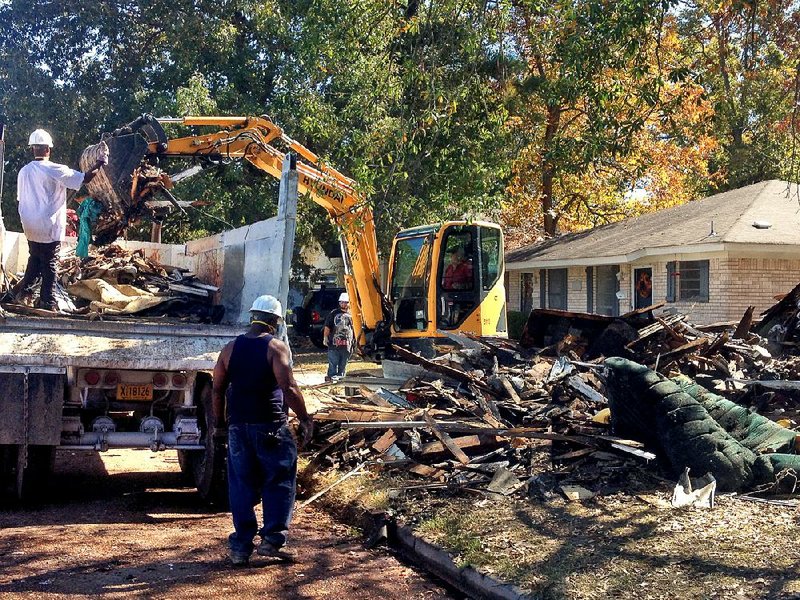The Arkansas Department of Environmental Quality has issued a consent administrative order against the city of Pine Bluff over its parolee- and prison-labor demolition program that was shut down last year, stipulating that the city must follow certain rules or be fined.
The city will have to pay $12,000 if it violates the rules in future demolition projects, City Attorney Althea Hadden-Scott said.
The city sought to demolish dozens of dilapidated buildings presumed to have asbestos, partly using state grants, with parolees and prisoners doing the work as part of a state Correction Department re-entry program.
On Friday, Department of Environmental Quality Director Becky Keogh signed the order, which states that the City Council has authorized payment of $12,000 in the event of a fine.
The order comes just more than 200 days after the U.S. Environmental Protection Agency released its findings that the city's demolition project was not adequately protecting workers from possible asbestos in the buildings being demolished. The findings forced the project to be shut down.
The Department of Environmental Quality issued the consent administrative order after conducting its own investigation of the site last year and determining that the city did not dispose of the demolition debris in accordance with state solid waste regulations.
The department did not issue a notice of violation to the city. It had been discussing a consent administrative order since last year.
"It is rare that enforcement matters start with a NOV [notice of violation]," department spokesman Kelly Robinson wrote in an email to the Arkansas Democrat-Gazette. "The Department initially attempts to address and resolve issues amicably through a CAO [consent administrative order]."
Robinson said the department has received no reports of worker illnesses.
The consent administrative order says the rules the city must follow are outlined in a memorandum of understanding between the state department and the city, but the department and the city gave conflicting opinions Wednesday on which memorandum of understanding was referred to in the report and what the rules were.
Robinson said the memorandum of understanding referred to in the order is the same one signed by the city and the state department in August 2015, outlining the rules the city must follow for its demolition project.
That one-page memorandum notes that only one house per city block can be demolished per year and that the structure must be sprayed with water beforehand to prevent asbestos particles from becoming airborne, among other things.
But Hadden-Scott said the memorandum referred to in the order has yet to be signed or negotiated. While the city has not resumed its demolition project, city leaders plan to meet with department officials to discuss how it could do so, at which point, she said, a new memorandum of understanding with new rules would be signed.
In July, the EPA inspected the demolition work and found numerous workplace health and safety violations, forcing the city and the Arkansas Community Correction to shut down the project.
Arkansas Community Correction was heading the project via a nonprofit created for it, called Mulligan Road, and had sought to work with the city in its first re-entry program that employed prisoners and parolees on teams.
The inspection found, among other things, that workers had not received asbestos training and were not wearing protective clothing, that there was no written respiratory protection program, that there was not always monitoring for asbestos, and that one supervisor did not have the training required to supervise the job.
Those violations referred to federal law and practices that were not outlined in the memorandum of understanding that the city and the department signed in August 2015.
The EPA has not issued any enforcement actions in the case, and the Arkansas Department of Environmental Quality has not issued any enforcement actions against Arkansas Community Correction.
Community Correction spokesman Dina Tyler and Mulligan Road Director Kevin Murphy said the EPA had approached Arkansas Community Correction officials about possible enforcement action and gave agency officials a draft of a potential enforcement order last year. Community Correction officials responded with a counter-agreement that the EPA is reviewing, Murphy said.
Although the city intends to resume its demolitions, Tyler said Arkansas Community Correction has no intention of continuing with the demolition project.
"The demolition project is dead and gone," Tyler said, adding that what the EPA wanted -- respirators and other remedies -- were too much for Arkansas Community Correction to handle.
Instead, the re-entry program now operates like a normal re-entry program, securing parolees jobs at restaurants and other workplaces.
"It's a shame because you know it was a good thing for Pine Bluff," Tyler said. "And it was a good thing for the offenders [to learn deconstruction and reconstruction]."
Metro on 02/02/2017
